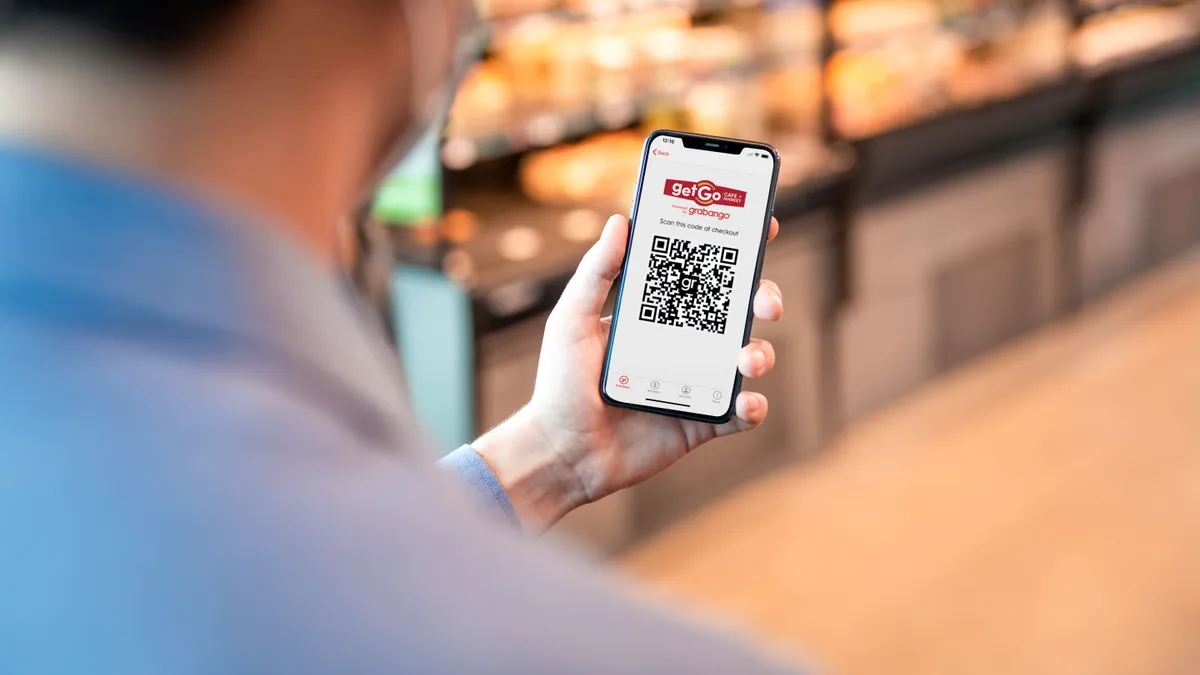Dive Brief:
- Grabango, which has developed a system that allows shoppers to bypass checkout stations in retail stores, on Tuesday launched its first commercial deployment at a Pittsburgh GetGo Cafe+Market convenience store operated by Giant Eagle, according to the California-based technology startup.
- The system uses cameras to detect products as a shopper selects them, adds them to a virtual shopping cart and collects payment when the customer scans a code on their smartphone on the way out of the store.
- Giant Eagle plans to follow the rollout of the technology at the 3,000-square-foot GetGo store with deployments at additional convenience and grocery stores in its fleet “in the near future,” according to a statement from the grocer. Other food retailers are also testing the Grabango system and plan to commercially deploy it in the future.
Dive Insight:
Grabango is vying with a number of other companies, including Amazon, Standard Cognition, Sensei and Zippin, for leadership in the nascent market for systems that make traditional point-of-sale systems unnecessary.
According to Grabango’s chief business officer, Andrew Radlow, the company’s approach to checkout-free systems stands out because it is designed expressly to be added to existing retail stores without impacting operations.
“As far as a true retrofit in an existing store using the existing merchandise and the existing shelving, with no barriers to entry, this is a big deal for the industry,” Radlow said.
The system, which began testing at the Giant Eagle location last year, relies on a series of tiny ceiling-mounted cameras with the acuity of the human eye to identify products based on their shape and other physical characteristics as customers pick them up, and can do so with more than 99% accuracy, Radlow said. The cameras are small enough to blend into their surroundings, yet have the ability to discern details about products from six to eight feet away.
Grabango’s technology depends on its machine learning capabilities, which train the system to distinguish one item from another regardless of where in the store they are located. The system does not depend on shelf-mounted sensors, which Radlow said would be a limitation because they depend on consumers taking products only from their designated locations, but is tied into the self-service scales that consumers use to weigh produce.
“We cover everything in the shopping space, from 10 feet in the air down to the ground,” Radlow said.
Grabango’s system tracks every product in the store and matches every shopper with their selections. Currently customers can only pay using a credit card linked to the Grabango mobile app, but future versions of the system will allow shoppers to use cash and pay using SNAP benefits, a Grabango spokesperson said.
The system is linked to the grocery’s loyalty program, which allows it to process digital coupons. Customers will be able to redeem paper coupons in the future by visiting a traditional cash register, according to Radlow.
Radlow would not discuss the cost to a retailer of installing its system, but said the return on investment more than outweighs the expenses that come with putting it in.
“This is not only a new shopper experience that cures the number one problem for shoppers, which is waiting in checkout lines, but it also dramatically improves the operating profitability of stores," Radlow said. "As this technology becomes more widespread and more common it will become a competitive differentiator that will change for the better the way people shop and the way stores operate."
Grabango also sees promise in harnessing its system to help grocers manage their e-commerce operations.
“If you know all of the products that are in a given shopping space, and what’s there and what’s not, then you can have mapping technologies for consumers as well as pickers," Radlow said.
Grabango’s most notable competitor is Amazon, which has been refining its checkout-free system at a growing number of Amazon Go convenience stores since 2018 and opened a larger Amazon Go Grocery store in February. Amazon is reportedly marketing its checkout-free technology to other retailers.













